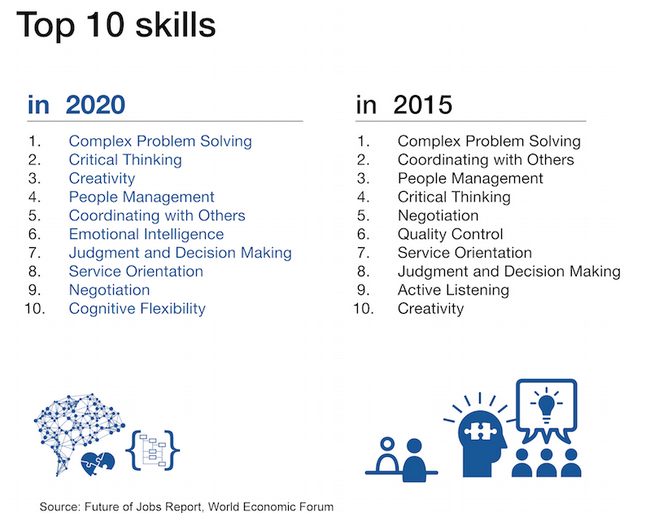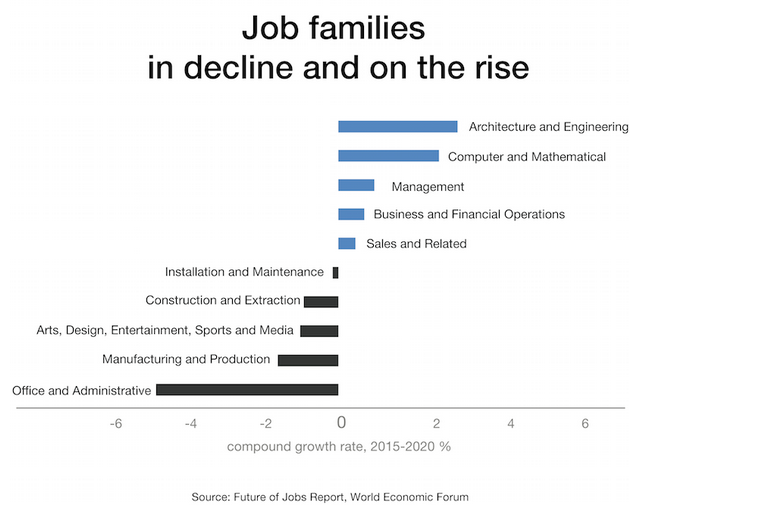Cape Town - Where will you stand in the job market of the future, and what skills will you need to remain relevant and, more importantly, employed in 2020?
Big changes are coming to the working world, according to a report entitled The Future of Jobs, published on Monday by the World Economic Forum (WEF). The so-called fourth industrial revolution will cause widespread disruption not only to business models but also to labour markets over the next five years, with enormous change predicted in the skill sets needed to thrive in the new landscape, said the WEF.
There will be substantial variations in the impact of this disruption across industries and gender, as well as job type. The jobs toll will be highest in the Healthcare industry in the next five years, according to the report. This will be followed jointly by Energy and Financial Services and Investors.
The biggest winner in the job stakes will be Information and Communication Technology, followed by Professional Services and Media, Entertainment and Information professionals.
In the working world of the future, men and women seem more or less equally likely to suffer job losses, with men at 52% and women at 48%.
Most of the survey's respondents - chief human resources officers and top strategy executives from companies across nine broad industry categories - believe the best way of dealing with these sweeping changes is by investing in reskilling current employees. "Other practices, such as supporting mobility and job rotation, attracting female and foreign talent and offering apprenticeships, also scored high," said the report.
Across all sectors, the most significant driver of change is the changing nature of work itself. "As new technologies make 'anytime, anywhere' work possible, companies are breaking up tasks in new ways, leading to a fragmentation of jobs across many industries," said the report.
These effects are heightened by the rise of mobile internet and cloud technology, making possible the rapid spread of internet-based service models. And while this new “gig economy” may be one of the most visible and current manifestations of disruptions to the labour market, further changes in specific sectors, both good and bad, will lead to new management and regulatory challenges, according to the WEF.
There is likely to be a significant shift in the most desirable skills in the job market. Looking at the top 10 most wanted skills in 2015, the report lists complex problem solving as number one, with coordinating with others and people management coming in at second and third respectively; creativity is cited last at number 10.
Fast forward to 2020, and the scenario changes: complex problem solving still occupies the top slot, but critical thinking and creativity take the second and third position, with cognitive flexibility coming in last at number 10.
Looking at countries and regions, the demographic, economic and technological development of each individual country is expected to shape the nature of future disruptions. "Overall, changing and flexible work is seen as the most significant driver of change in advanced economies, whereas the rising middle class takes this role in emerging markets," said the report.
The mobile internet will have a huge impact on some developing countries, with its potential to bring millions of formerly unconnected workers and consumers into the formal economy for the first time.
Specific industries will be impacted in very different ways by the drivers of change, said the report. "For example, new energy supplies and technologies will have a particular impact on Energy, Basic and Infrastructure, and Mobility. Processing power and big data will have an especially strong impact on Information and Communication Technology, Financial Services and Professional Services."
Emerging markets' up-and-coming middle class will be the biggest driver in Consumer, Financial Services and Mobility while Consumer ethics and privacy issues will strongly influence the Consumer, Financial Services and Information and Communication Technology industries.
Some job families will score, while others will be dented by a significant relative decline. Change is set to rock the Financial Services sector, where 43% of the top skills needed in all job families across the industry are expected to shift by 2020. Basics and Infrastructure (42%) and Mobility (39%) can also expect significant changes, while Media, Entertainment and Information (27%) and the Consumer industry (30% ) should be disrupted the least.
Two new and emerging job types are expected to become critically important by the year 2020, according to the WEF. The first of these is data analysts, because companies will need help to make sense of the torrent of data generated by the anticipated technological disruptions.
The second job type highlighted by the report is specialised sales representatives. This is because practically every industry will need to become skilled in commercialising and explaining their offerings to clients.
“Our analysis reveals that upcoming disruptions to the employment landscape will be about much more than simply automation. It is essential that we act collectively now to prepare ourselves for the changes that we know the Fourth Industrial Revolution will bring,” said Saadia Zahidi, WEF head of the global challenge on employment, skills and human capital.




 Publications
Publications
 Partners
Partners












